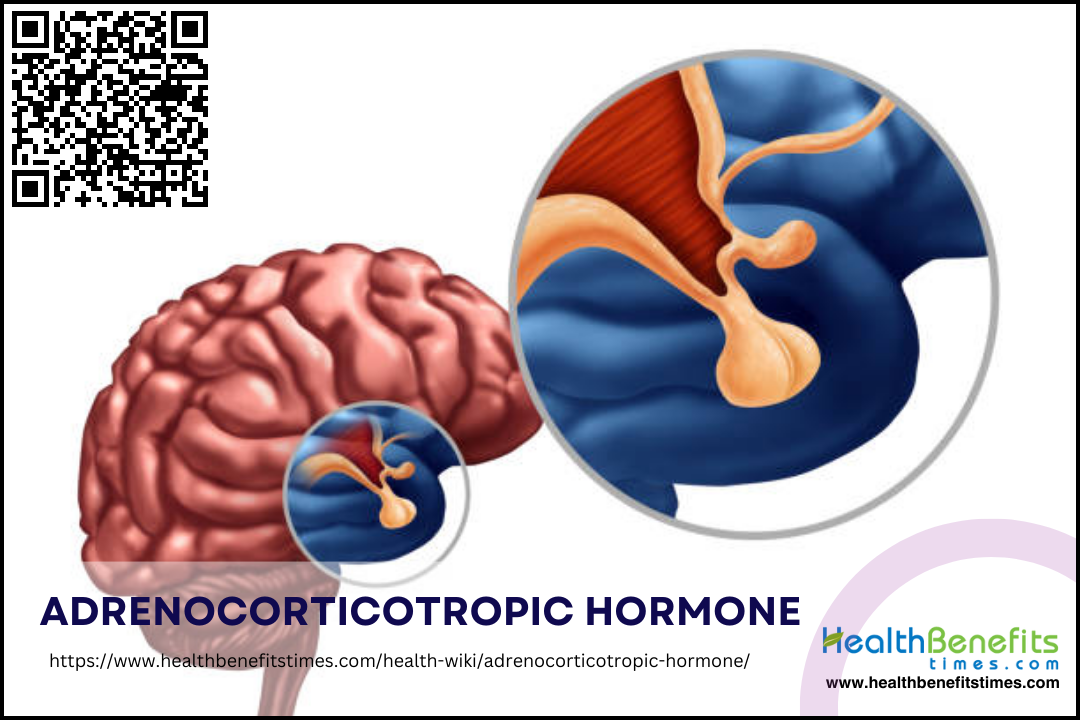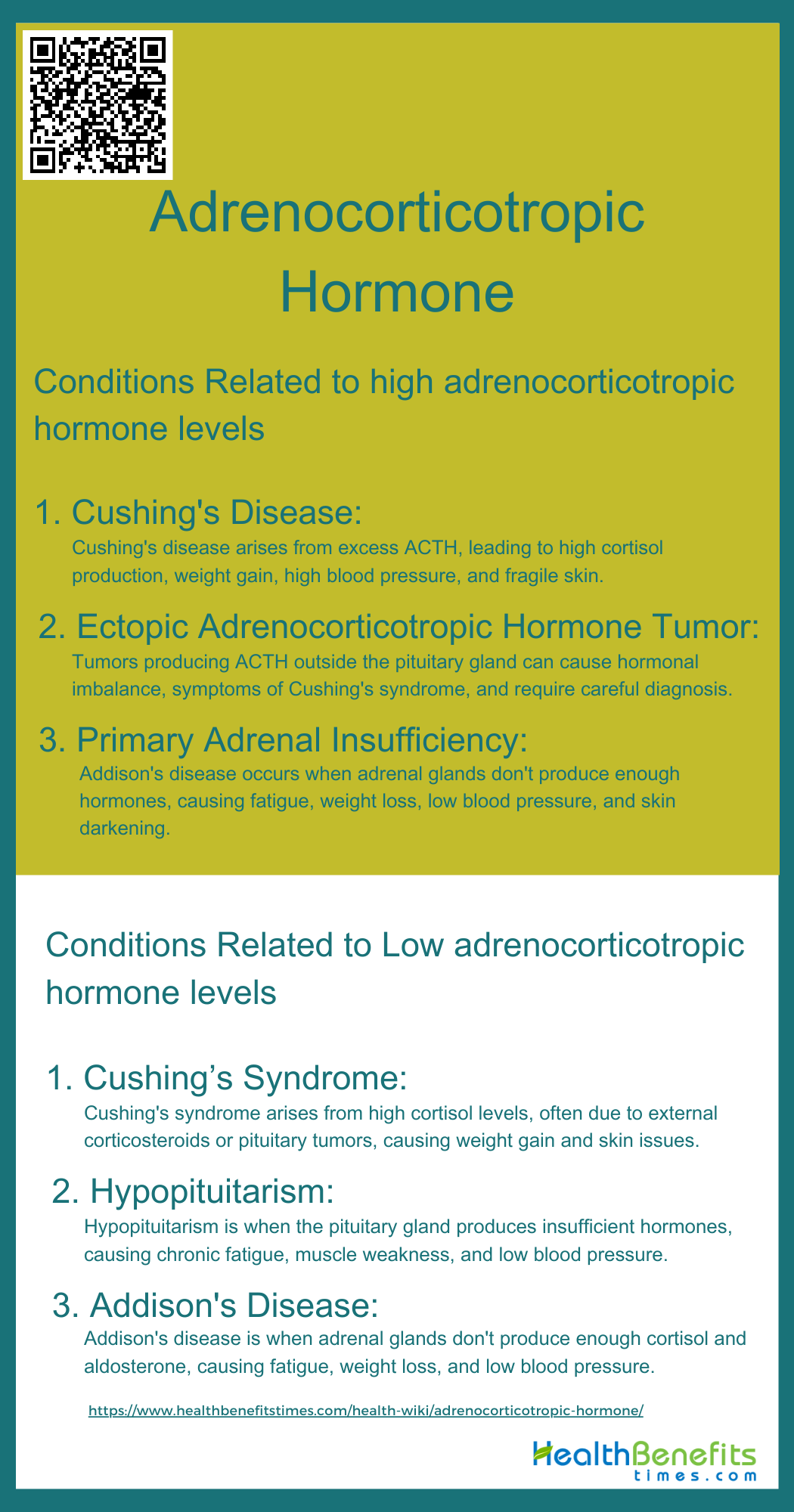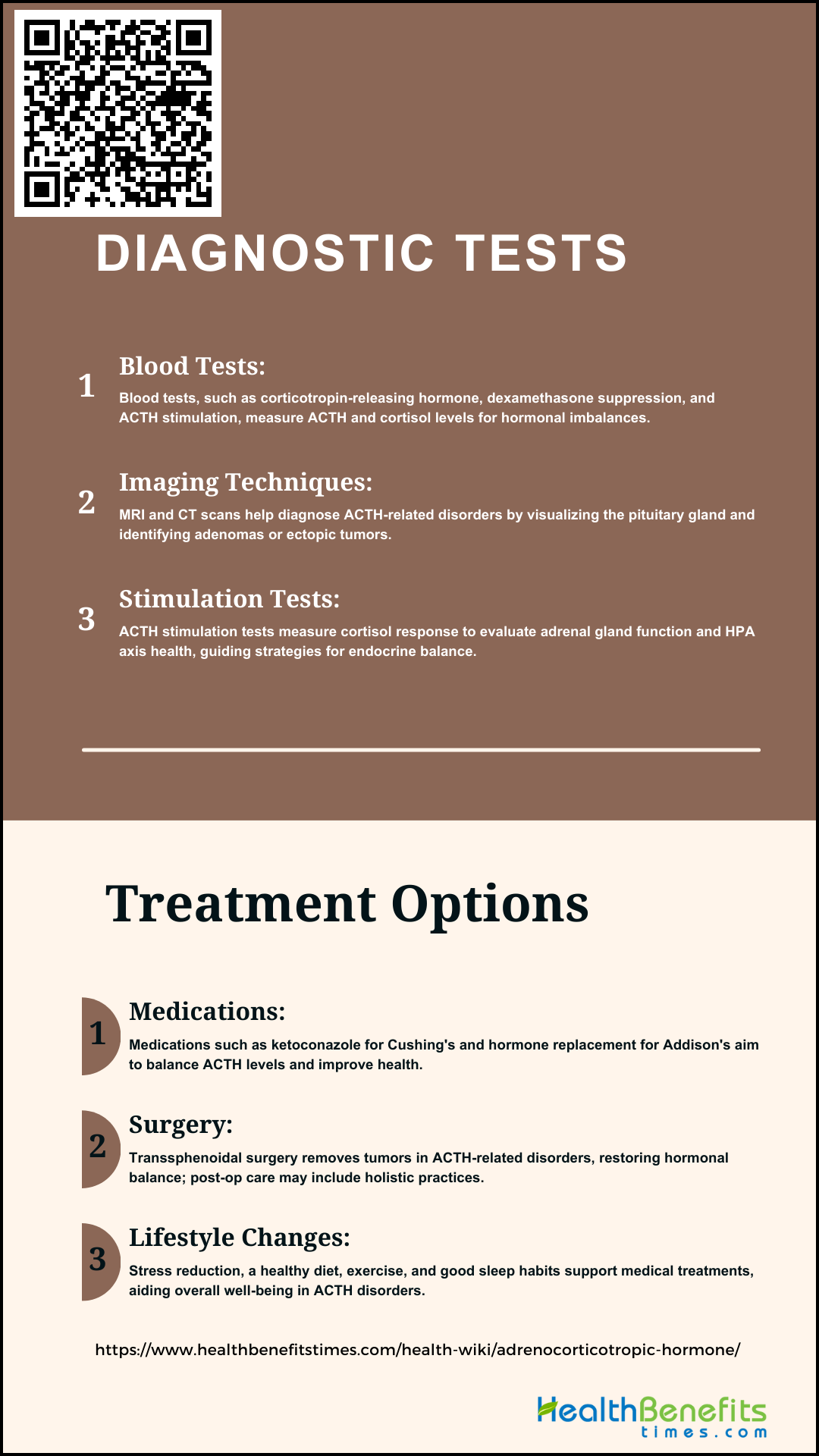 Adrenocorticotropic Hormone (ACTH) is a vital hormone secreted by the pituitary gland that orchestrates the body’s stress response by prompting the adrenal glands to produce cortisol, a key hormone in regulating metabolism, immune function, and blood pressure. Its role extends to influencing our energy levels and how we handle stress, making it a critical element in the pursuit of holistic health and fitness. Recognizing the importance of ACTH can enhance one’s understanding of how to maintain internal balance and wellness, crucial for anyone looking to optimize their health regimen and ensure it resonates with their body’s natural processes.
Adrenocorticotropic Hormone (ACTH) is a vital hormone secreted by the pituitary gland that orchestrates the body’s stress response by prompting the adrenal glands to produce cortisol, a key hormone in regulating metabolism, immune function, and blood pressure. Its role extends to influencing our energy levels and how we handle stress, making it a critical element in the pursuit of holistic health and fitness. Recognizing the importance of ACTH can enhance one’s understanding of how to maintain internal balance and wellness, crucial for anyone looking to optimize their health regimen and ensure it resonates with their body’s natural processes.
Function of Adrenocorticotropic Hormone
According to article, the adrenocorticotropic hormone (ACTH), a 39 amino acid peptide produced by the anterior pituitary gland, is instrumental in the body’s ability to tackle stress and maintain balance. By signaling the adrenal glands to release cortisol, ACTH regulates vital functions such as metabolism, immune responses, and inflammation, helping the body adapt to both external and internal pressures. In holistic health practices, recognizing the significance of ACTH is crucial, as it not only supports physical resilience but also contributes to mental and emotional equilibrium. This understanding underscores the importance of a balanced endocrine system for optimal health and wellness.
Conditions Related to high adrenocorticotropic hormone levels
High adrenocorticotropic hormone (ACTH) levels can indicate several health concerns, emphasizing the necessity of hormonal balance for overall fitness and wellness. Recognizing conditions associated with increased ACTH is essential for effective health management and maintaining the body’s endocrine system equilibrium. It is a key step in pursuing a holistic approach to health and well-being.
1. Cushing’s disease
Cushing’s disease is a complex hormonal disorder where the pituitary gland produces too much adrenocorticotropic hormone (ACTH), triggering an overproduction of cortisol by the adrenal glands. This can lead to a variety of symptoms, such as rapid weight gain in the face, chest, and abdomen, a rounded “moon face,” and visible purple stretch marks. The condition also often causes significant fatigue, high blood pressure, fragile skin, and, in some cases, type 2 diabetes. High cortisol levels can disrupt overall health, emphasizing the need for balanced hormones. Holistic health approaches suggest a comprehensive strategy, including stress reduction and nutritional support to manage the physical and emotional impacts of Cushing’s disease and promote healing.
2. Ectopic adrenocorticotropic hormone tumor
According to article, Tumors that produce excess adrenocorticotropic hormone (ACTH) outside of the pituitary gland, known as ectopic ACTH tumors, pose a serious health challenge. Commonly located in the lungs, but also possible in other tissues, these tumors can cause significant hormonal imbalances, leading to Cushing’s syndrome with symptoms like rapid weight gain, high blood pressure, muscle weakness, and changes in skin appearance. Early diagnosis is vital, combining biochemical tests, hormonal assessments, and imaging to identify the source. For those passionate about holistic health, it’s important to understand that traditional treatments such as surgery and medications can be complemented by lifestyle adjustments and natural therapies. These integrative strategies can help manage the symptoms and support overall well-being by nurturing the body’s physical, emotional, and mental health in the face of ectopic ACTH tumors.
3. Primary adrenal insufficiency
Primary adrenal insufficiency, commonly referred to as Addison’s disease, is a serious condition where the adrenal glands located above the kidneys fail to produce adequate steroid hormones, despite elevated adrenocorticotropic hormone (ACTH) signals from the pituitary gland. This hormonal imbalance can result from various factors, such as autoimmune disorders, genetic conditions, or the long-term use of corticosteroids. Those afflicted with Addison’s disease may experience symptoms like persistent fatigue, muscle weakness, unintended weight loss, skin darkening, and a strong desire for salty foods, coupled with low blood pressure. To manage this condition effectively, a holistic health approach encompasses medical solutions, such as hormone replacement therapy, alongside lifestyle and dietary changes. Incorporating stress reduction techniques, nutritional support, and regular exercise can help restore the body’s natural equilibrium, supporting the healing process and enhancing overall well-being.
Conditions Related to Low adrenocorticotropic hormone levels
Low levels of ACTH can lead to a variety of health issues that may impact overall well-being. Understanding these conditions is the first step toward holistic health management. Below is a list of conditions associated with low ACTH levels.
1. Cushing’s syndrome
Cushing’s syndrome is a health condition characterized by the body’s exposure to abnormally high cortisol levels over time. This can be due to the body’s own overproduction of cortisol, often from a pituitary gland tumor, or from external sources like oral corticosteroid medication. Symptoms such as rapid weight gain, particularly in the midsection and upper back, facial roundness, a “buffalo hump” on the neck, and easily bruised, thinning skin are common. When the condition stems from non-ACTH-dependent sources, it leads to decreased ACTH levels, making diagnosis challenging. Treatment typically involves surgery, medication, or radiation therapy to address the root cause, while holistic management includes lifestyle changes and stress management to support overall health and well-being.
2. Hypopituitarism
Hypopituitarism is a rare but significant health condition where the pituitary gland doesn’t produce enough hormones, notably adrenocorticotropic hormone (ACTH), leading to a cascade of issues including chronic fatigue, muscle weakness, and low blood pressure. These symptoms stem from a drop in cortisol production, essential for immune function and stress response. Causes range from tumors and head injuries to autoimmune diseases. Holistic management goes beyond hormone replacement therapy; it integrates nutritional support, stress relief practices, and lifestyle changes to enhance endocrine health and overall well-being. In addressing hypopituitarism, a multi-faceted approach ensures that treatment is as comprehensive as the condition’s effects on the body.
3. Addison disease
According to article, Addison’s disease, a rare but serious condition known as primary adrenal insufficiency, emerges when the adrenal glands do not produce enough hormones, particularly cortisol and aldosterone, due to damage or dysfunction within the adrenal cortex. This disorder can lead to a host of symptoms ranging from chronic fatigue and muscle weakness to weight loss and low blood pressure. Often associated with neuropsychiatric issues like psychosis and cognitive disorders, Addison’s requires vigilant medical oversight. Holistic health enthusiasts advocate for stress reduction, dietary modifications to boost sodium, and adaptogenic herbs to aid adrenal function. Alongside these strategies, hormone replacement therapy and regular health monitoring are essential to manage this condition effectively.
Diagnostic Tests for ACTH-related Disorders
For those dedicated to holistic health, recognizing the significance of adrenocorticotropic hormone (ACTH) is essential, as it orchestrates our stress response and vital functions. Pinpointing ACTH disorders through key diagnostic tests is a cornerstone for restoring health equilibrium and enhancing overall wellness. These evaluations are imperative for anyone seeking a balanced and robust immune system, optimal energy levels, and a harmonious state of being.
1. Blood tests
According to article, Blood tests are a vital tool in the holistic health realm, particularly for detecting conditions like Cushing’s and Addison’s disease by measuring levels of Adrenocorticotropic Hormone (ACTH). Essential tests such as the corticotropin-releasing hormone test, dexamethasone suppression test, and ACTH stimulation test provide insights into the adrenal function and stress response. Typically conducted in the morning when ACTH peaks, these tests require a simple blood sample and often juxtapose ACTH with cortisol levels to pinpoint imbalances. The informed integration of these results into one’s health strategy enables practitioners to devise personalized wellness plans that resonate with the body’s inherent healing abilities, offering a tailored approach to managing hormonal health.
2. Imaging techniques
According to article, the realm of holistic health and wellness advanced imaging techniques such as Magnetic Resonance Imaging (MRI) and Computed Tomography (CT) scans are indispensable in diagnosing and managing ACTH-related disorders like Cushing’s disease. MRI scans shine as the premier choice for delineating the intricacies of the pituitary gland to detect adenomas, while CT scans come into play for locating ectopic tumors responsible for excess ACTH production. These non-invasive imaging modalities are integral to a comprehensive diagnostic process, providing a clear view of the body’s interior and supporting healthcare professionals in crafting personalized treatment strategies that resonate with the core values of health and fitness. Through a synergy of cutting-edge technology and clinical expertise, a path to balanced wellness is charted for those facing hormonal imbalances due to neuroendocrine tumors.
3. Stimulation tests
In diagnosing disorders tied to adrenocorticotropic hormone (ACTH), stimulation tests, such as the ACTH stimulation or cosyntropin test, are pivotal for evaluating adrenal gland function. By administering synthetic ACTH and measuring subsequent cortisol levels, these tests determine the health of the hypothalamic-pituitary-adrenal (HPA) axis. While the insulin tolerance test is the gold standard for assessing this axis, it is less commonly used than the ACTH stimulation test due to safety concerns. Varied cortisol responses may indicate conditions like Addison’s disease or secondary insufficiency from pituitary dysfunction. Newer, more specific assays for cortisol are recommended to ensure precise diagnoses. Understanding test outcomes is crucial in adopting holistic health strategies, such as lifestyle changes and stress management, to promote endocrine balance and overall wellness.
Treatment Options for ACTH-related Disorders
ACTH imbalances, responsible for various health conditions like Cushing’s syndrome and Addison’s disease, demand a holistic management strategy that extends beyond medical treatments to include lifestyle and diet adjustments. This integrative approach aims to restore hormonal harmony by merging traditional medical practices with comprehensive wellness techniques. Delve into the myriad of options available for tackling the complexity of ACTH-related disorders with a focus on whole-body health.
1. Medications
According to article, in the sphere of holistic health, effectively managing ACTH-related disorders, such as Cushing’s and Addison’s disease, hinges on a delicate balance of medications designed to regulate hormonal imbalances. For those facing the excess cortisol production characteristic of Cushing’s disease, treatment options like ketoconazole, metyrapone, or mitotane are utilized to decrease cortisol levels, whereas Addison’s disease necessitates hormone replacement therapies, including hydrocortisone or prednisone, to replenish adrenal hormones. It’s crucial to tailor these treatments to the individual, often incorporating them within a broader, integrative strategy that embraces lifestyle and dietary modifications, alongside stress reduction techniques, to enhance overall health and minimize adrenal strain.
2. Surgery
Surgery, particularly the transsphenoidal approach, plays a crucial role in treating ACTH-related disorders, including Cushing’s disease. By precisely removing the tumor through the nasal passage, this minimally invasive technique offers a quicker recovery and less discomfort, effectively restoring hormone balance and alleviating symptoms. While holistic health enthusiasts often favor natural healing, it’s essential to recognize that, in certain medical conditions, surgical intervention is necessary to reestablish wellness. Post-operative care may well incorporate holistic practices, such as lifestyle adjustments and stress management, highlighting the complementary relationship between conventional medicine and holistic approaches. This integrated pathway can lead to improved health outcomes for those battling complex endocrine disorders.
3. Lifestyle changes
Adopting a holistic approach to managing Adrenocorticotropic Hormone (ACTH) disorders, a combination of healthy lifestyle choices significantly enhances the effectiveness of medical treatments. Stress reduction is critical, as elevated stress levels directly affect cortisol secretion, so integrating relaxation practices such as yoga, meditation, and deep-breathing exercises is highly recommended. A nutrient-rich diet bolsters adrenal and endocrine health; while regular exercise suited to individual fitness levels helps maintain mood, energy, and hormonal balance. Prioritizing adequate hydration and sleep, including a regular sleep schedule, is also essential in supporting the body’s stress response system. Eliminating stimulants like caffeine and moderating sugar intake are additional steps that can alleviate symptoms. Patients should collaborate with healthcare professionals to tailor a personalized lifestyle regimen that supports their journey toward wellness in the face of ACTH-related conditions.

